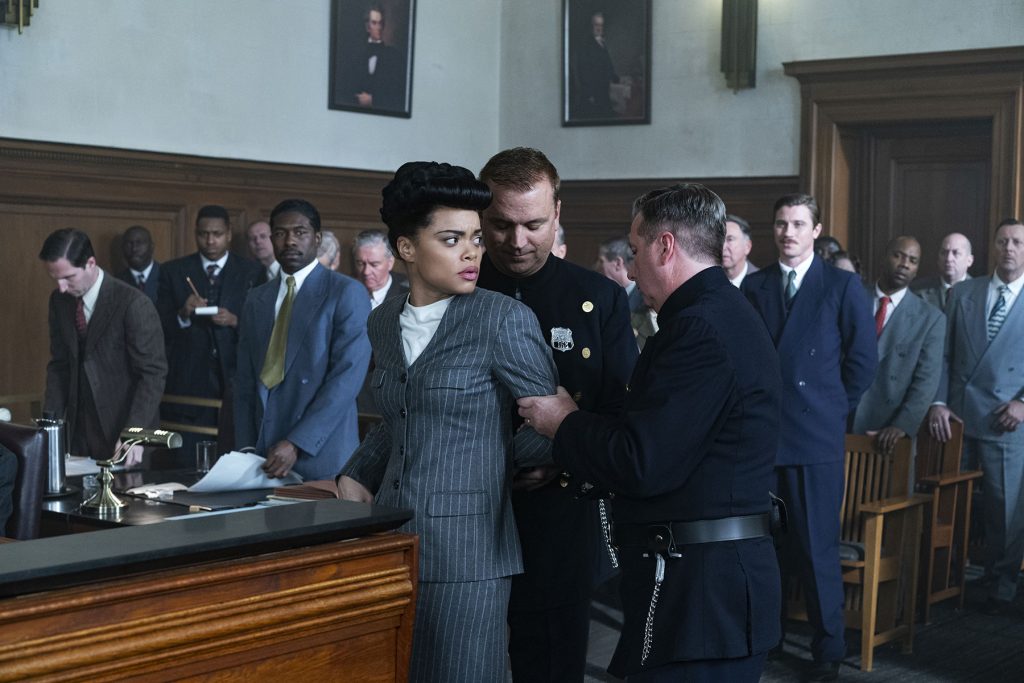The United States vs Billie Holiday features a powerhouse performance from singer/songwriter Andra Day, but its story is sadly substandard.
Every awards season, we seem destined to receive a deluge of biopics about highly regarded historical icons both big and large, allowing actors the chance to sink their teeth into some of the meatiest roles of their entire career and showcase their talents within the confines of a story that will attract more interest than the average “indie.” When these movies contort the cinematic form or make use of an innovative story structure, they can certainly stand out – see 2015’s Steve Jobs, 2016’s Jackie, or 2017’s I, Tonya. However, when they tell a standard and straightforward “cradle-to-grave” tale, they rarely rise above “run of the mill” and prove fully forgettable in the end (John C. Reilly’s 2007 comedy classic Walk Hard: The Dewey Cox Story skillfully skewers these conventions and cliches in farcical fashion).
Lamentably, Lee Daniels’ (Precious, The Butler) The United States vs Billie Holiday falls into the latter category. While the film features a powerhouse performance from singer/songwriter Andra Day in her big-screen breakthrough, the narrative in its totality is unfortunately undeserving of her absorbing authenticity and marvelous musicality, instead emphasizing banal biopic beats over more intriguing insight into the history of Billie Holiday and her lasting legacy. Daniels’ drama isn’t without a fascinating fury against racial injustice in America, but it never completely coalesces into a coherent whole when all is said and done.
Beginning at the height of Billie Holiday’s influence in the music industry, The United States vs Billie Holiday primarily focuses on the Federal Department of Narcotic’s campaign to apprehend and arrest Holiday (Andra Day) for her drug abuse in an effort to silence her and stop her from singing the incendiary “Strange Fruit” at her concerts – a song that speaks to the anger of African Americans everywhere but comes across as a “declaration of war” to the U.S. government. Federal agent Jimmy Fletcher (Trevante Rhodes, of Moonlight and Bird Box) is assigned to follow Ms. Holiday, but as he grows to be beside himself with guilt at “betraying” one of the cherished idols of his community and additionally develops an attraction towards Billie, a tumultuous affair arises, putting both on a path towards further turmoil. Can the two keep this act up? Can Billie handle her drug habits? Can she ever share “Strange Fruit” with the world?
On its face, The United States vs Billie Holiday seems like a fairly simple story. There’s the star-crossed romance between Holiday and Fletcher, and there’s the government’s ongoing grievances with Billie’s power over the public – not too much to tackle in one movie, right? Sadly, screenwriter Suzan-Lori Parks (Native Son, Girl 6) stretches this tragedy out well beyond what is natural for the narrative, resulting in a film that is both overlong (at an outrageous 130 minutes) and overly redundant, repeating the same scenes ad nauseam and diminishing their individual impact as a result. How many times must we see Billie hit rock bottom, rise to “clean up her act,” and subsequently stumble yet again? Or what of the similarly superfluous sequences of Billie’s ups and downs with abusive husband Louis McKay (Rob Morgan, of The Last Black Man in San Francisco and Just Mercy)? There’s no denying that these are monumental moments in Holiday’s history, but when the film “checks these conflicts off” without compelling commentary of any kind, it reduces Holiday’s real-life woes to typical melodrama tropes.

Furthermore, The United States vs Billie Holiday simultaneously struggles to incorporate its institutional antagonists – commonly characterized by Garrett Hedlund’s (Inside Llewyn Davis, Tron: Legacy) Harry Anslinger, the head of the Federal Bureau of Narcotics – into its depiction of Holiday’s debilitating drug addiction and her related romantic ruination. When either of those two troubles start to pose less of a problem for Holiday at a given time, it’s as if the movie suddenly remembers the government’s grudge against her, and this clash somehow takes center stage again. In addition, these adversaries are never more than regular old racist stock characters; no one is demanding that they be afforded as much humanity as Holiday by any means, but when these government officials are mere “mustache-twirling,” cartoon-esque enemies, it’s hard to take them seriously or feel as if the movie is rooted in realism in any regard.
Instead, The United States vs Billie Holiday fares far better when it prioritizes the push-and-pull of Holiday and Fletcher’s relationship, primarily because it gives both Day and Rhodes ample screen time to shine and highlight their compassionate portrayal of these characters. Day almost single-handedly redeems the entire story, acting as a sterling successor to Diana Ross (who played this same role in 1972’s Lady Sings the Blues) and treating Holiday as a three-dimensional individual, even when the script shortchanges her. She handles the “stagier” spectacle honorably (the wild drug withdrawals, the aforementioned altercations with her lovers), but she truly soars outside of these dry displays. When she’s onstage, it’s as if Day is in another film entirely, channeling a captivating charisma that simply stupefies the audience and reminds viewers of the brash brilliance of Billie Holiday. Her voice is as electrifying as expected (go listen to Day’s “Rise Up” if you need an example of her expertise), but her ability to hone in on Holiday’s hurting is just as artful, and she provides far more perceptiveness than what’s on the page.
Moreover, Day’s chemistry with Rhodes is consuming, and the film rarely feels as ravishing as it does in the scenes they spend together, testing one another’s allegiances and interrogating each other’s insecurities in ways that no one else will. Though the two are meant to be at odds, it’s easy to see why Holiday and Fletcher’s relationship evolves into a more enchanting and erotic arrangement, as the temptation is tangible from their first interaction, and their connection is clearly unlike anything either character has ever experienced (making Fletcher’s disdain for his governmental duties appear more reasonable as a result). Day and Rhodes look at one another with such love (and lust) that we can’t help but be sold by this seduction, and when the film strays from their burgeoning bond, it falters.
However, this one storyline isn’t enough to save The United States vs Billie Holiday. By the time the film lumbers towards its funereal finale, this passion has all but perished, and we’re left with a cliché conclusion for an artist who was anything but. Billie Holiday radiates a resplendent reverence for its leading lady – and director Lee Daniels’ heart is clearly in the right place – but a stereotypical and scattered script undercuts these attempts to pay homage to Holiday, despite Day’s best efforts in the title role. While the potential was there for an exciting exploration into this musical legend’s legacy, The United States vs Billie Holiday misses the mark.
The United States vs Billie Holiday will be released in the United States on February 26, 2021, on Hulu.

